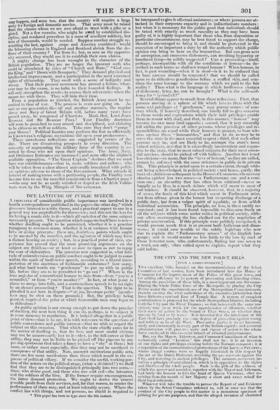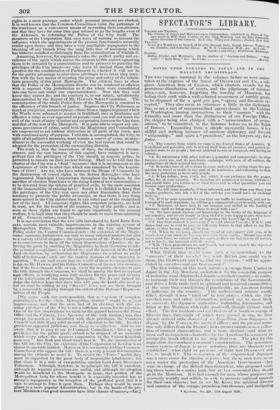Two excellent bills, founded on the recommendations of the Select
Committee of last session, have been introduced into the House of Commons for the improvement of the Police of this great town, and for adding efficiency to its powers of preventing and detecting crime. Among the Fovisions of these bills, is a most important one for conso- lidating the whole Police force of the Metropolis, by placing the City Police under the superintendence of the Metropolitan Commissioners, thereby oaqing the civic authorities of the exclusive jurisdiction they have hitherto exercised East of Temple Bar. A system of complete centralization is proposed Mr the whole Metropolitan District, including 1;Aim the City and the II i ver Thames ; so that hencelOrth the same ma- chinery may be at work for the apprehension of offenders, N.lictlier their scene of action be the Strand or Fleet Stret-t, or vlicilier they operate by land or by water. It is intended that the inhabitant of the East shall have precisely inc same degree of protection against wrong and robbery as he of the \Vest. Preventive justice is to act harmoni- ously and consistently in every part of the British capital ; and a central administration will preserve unity and vigour of action to the whole force employed in this essential branch of criminal jurisprudence.
But, say the Mayor. Aldermen, and Common-Councilmen of what is tech»ically called London," this shall not he it is an invasion of our rights and privileges existing before the Norman conquest ; it is a repetition of the unconstitutional proceedings of the last tire STUARTS; whose iiiegal courses were so happily frustrated in this respect by the act of the Dutch Deliverer, reversing the quo warranto against the City, and restoring its aneient privileges. The measure, mmeover, in- VOINTS a principle ofeentralization, which is in opposition to the rights and liberties of the whole people. Such is the pith of the address, of which the mover and seconder, together with the Mayor and Aldermen, had lately the honour to kiss the hand of Queen VICTORIA, after re- ceiving from the mouth of her Majesty a short and sweet rebuff for their loyal solicitude. Whoever will take the trouble to peruse the Report of and Evidence taken by the Select Committee referred to, will at once see that the conduct of the City people in this matter is a monstrous specimen of jobbing for private purposes, and that the alleged invasion of chartered
rights is a mere pretence under which personal interests are cloaked. It is well known that the Common-Councilmen value the patronage of the watchmen as a convenient means of rewarding their constituents, and that they have for some time past refused to go the lengths even of the Aldermen in reforming the Police of the City itself. The members of the Corporation find easy ways of turning to account the ,influence which the appointments of the present functionaries naturally confer upon them ; and they have a very intelligible repugnance to the breaking off any branch from the snug little tree of monopoly which has hitherto ramified so thrivingly from the centralization of Guildhall.
Assuming, however, for argument's sake, the perfect purity and ex- cellence of the spirit which moves the citizens in this matter—granting them to be actuated by a conscientious zeal to preserve to posterity the privileges of the City intact—we take leave to remind them, that the question for the consideration of Parliament is, whether it will not be for the public advantage to alter those privileges in so far as they inter- fere with the best means of securing the peace and safety of the inhabi- tants generally of this great Metropolis. The citizens have to show that the Police of the Metropolitan district can be rendered us efficient with a separate City jurisdiction as. if the whole were consolidated into one force and under one superintendence. Now this they well know they cannot do; and the contrary is, to our minds, satisfactorily demonstrated by the Report of Mr. IlAwns's Select Committee. The centralization of the whole Police force of the Metropolis is essential to the efficiency of this branch of justice. Improve the City Policemen as much as you please, metamorphose—them from a ragged regiment which the Wards were ashamed to muster in Guildhall, into as handsome and effective a corps as ever appeared on parade—and you will not touch the evil of the want of unity °faction and coilperation between the City force and that of the rest of the Metropolis.. It is quite idle to expect any ade- .quate prevention of crime, until both the Magistracy and Constabulary are empowered to act without distinction in all parts of the town, and with combined unity of purpose. Until this is accomplished, the City, in spite of all palliative measures, must remain a reserve of' crime, an impe- diment to the successful working of even the best system that could be adopted for the protection of the surrounding districts. The truth is, that the innovations of time, the changes in circum- stances, and the vast increase of this capital, have rendered it inex- pedient that the privileges of the City should, as respects police, be permitted to remain on their ancient footing. Shall we be told that the charter of the City was a "final" measure? that it is incompetent to the Legislature of 1839 to alter that which was sanctioned by the Legisla- ture of 1690? Are we, who have reformed the House of Commons by the destruction of vested rights in the Rotten Boroughs—who have regenerated Municipal Corporations throughout the kingdom, by the sacrifice of obsolete franchises to the rising wants of new communities— to be deterred from the reform of practical evils, by the mere assertion of the immutability of existing laws? Surely it is childish to fancy that the privileges of the City rest upon any other foundation than their tendency to promote the public advantage, or that there is any thing more sacred in the City charter than in any other part of the recognized law of the land. All corporate rights, like corporate property, are held in trust, not for the benefit of the trustees, but of the public ; and so soon as those rights are found to operate injuriously to the general welfare, it is high time that they should be made to cease from operating at all. C'essante ?Winne, cossut lex.
It is our conviction that the two bills introduced by Lord JOHN RUS- SELL contain most valuable improvements in the existing system of Metropolitan Police. The consolidation of the City and Thames Police under the Central Commissioners ; the extension of the 'Magis- trates' summary jurisdiction not only to many crindnal matters, but also to a variety of civil disputes ; the improvement of the Police Courts so as to concentrate in them all the minor dispensations ofjustice ; the re- lieving the gaols by enabling the Magistrates in their discretion to take the personal recognizances of offenders; and the removal oldie Grand Jury Obstruction, by authorizing the Magistrates themselves to prefer bills of indictment ; such are t lw leading features of the measures in question. We are well aware that the credit of these recommendations is due to Mr. HA %suss, and his Police Committee of the last two sessions ; but if the Government will, or can, exert the requisite energies to pass the bills through the Counnons, we shall be among the first to applaud such aims, as testifying sonic little an for the peace and security of the inhelphants of this gigantic )letri yolis. We do not indeed in- dulge the faintest hope that these bills will pass the Lords this session ; but we shall be willing to cry "Bravo !" if we can see them brought by a respi.etable majority through the ordeal of the fit:flirt/lei/ Represen- tatives it the People.
[We agree with our correspondent, that a " system of complete centralization fie' the Whole Metropolitan district " would be a great improvement and that the mere thet of its clashing with the ex- isting privileges of the City is not a sufficient reason Ibr its rejection. One of the Ii, iv observations we made on the quarrel between the llome Office and the Citizens, (see Spectator of the lsth instant,) was, that except inasmuch Its it interfered with their privileges, the Common Council bad little if any solid ground of objection to the bill. Its chief provisions appeared judicious, and likely to he effective. And We are aware that it is easy to say to Common Councilinen," Give lip your privikg,A for the public good; submit to be stripped of an alt hority which every other, the meanest corporation in the 1-nited Kingdom possesses." [bit flesh and blood won't bear it. To the introduction of this bill into the City, the existence of the Corporation of London is an almost insuperable barrier. Moreover, it is not merely jobbing Common - Councilmen who oppose the bill : there is a very general determination among the citizens to resist it. To render the '• Force " useful, they
must be supported by the great body of respectable inhabitents ; but that cdass is in a state of exasperation against Lord Jolts IlessEm,'s Policemen. Although, therefore, in its principle the bill is excellent, although its separate provisions are useful, and although its adoption would be beneficial to the Metropolis at large, that portion of the Metropolitan body for whose benefit it is especially intended has so strong a repugnance to the reception of the proffered good, that it is vain to attempt to force it upon them. Perhaps they would be more pliant to a more popular Administration ; but in the hands of the pre- sent Ministers even good measures have little chance of suceesF.—ED.]



























 Previous page
Previous page